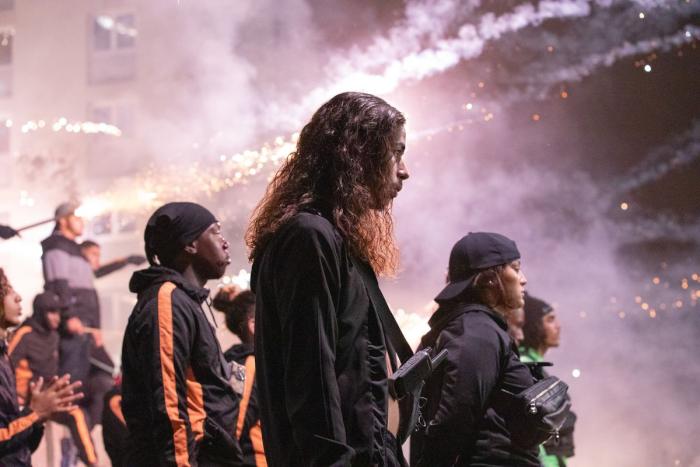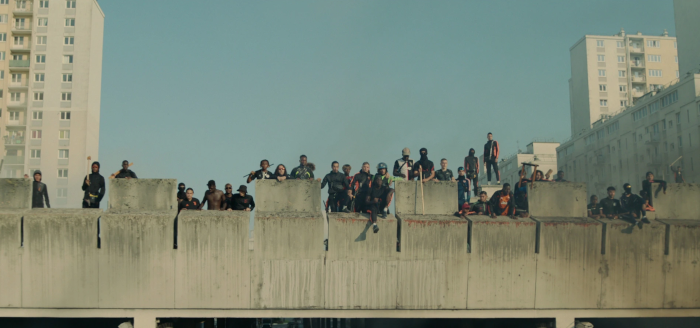By Petr Navovy | Film | September 27, 2022

There’s a passage from Mark Twain’s 1889 novel, ‘A Connecticut Yankee in King Arthur’s Court’, that touches on the French Revolution, and specifically all the attention that gets paid to the violence of the Reign of Terror:
There were two ‘Reigns of Terror,’ if we would but remember it and consider it; the one wrought murder in hot passion, the other in heartless cold blood; the one lasted mere months, the other had lasted a thousand years; the one inflicted death upon ten thousand persons, the other upon a hundred millions; but our shudders are all for the ‘horrors’ of the minor Terror, the momentary Terror, so to speak; whereas, what is the horror of swift death by the axe, compared with lifelong death from hunger, cold, insult, cruelty, and heart-break? What is swift death by lightning compared with death by slow fire at the stake? A city cemetery could contain the coffins filled by that brief Terror which we have all been so diligently taught to shiver at and mourn over; but all France could hardly contain the coffins filled by that older and real Terror—that unspeakably bitter and awful Terror which none of us has been taught to see in its vastness or pity as it deserves.
The point being, as if I could spell it out any clearer than Mr. Twain, is that peace on the terms of the oppressor is no peace at all. As the popular protest chant goes: ‘No justice, no peace!’ Whether through poverty, police violence, or war, the establishment has a way of framing the violence it inflicts upon people as something natural, necessary, unquestionable. That’s the way empires project their power abroad, and the way they subjugate the masses back home too. With the world’s populations shaped by the movements of peoples brought about by the pillages of said empires, the two situations are intertwined; reflections of one another; the oppressor inflicting violence at every stage. Then, if it so happens that the oppressed have enough and they revolt against their oppression, the oppressor will cry out against the act, decrying the ‘violence’ and the ‘disorder’ and urging a return to ‘order’ and ‘peace’.
You hear this kind of disingenuous rhetoric whenever people rise up. To take just one of a thousand examples, we heard this a lot in the UK in the summer of 2011, when the marginalised communities of Tottenham, North London, spontaneously rose up following the police execution of Mark Duggan. A structurally racist system manifesting itself in economic degradation, police harrassment, and lethal police violence, will eventually find that something has to give. Anger that has built up over generations has a way of exploding. In this case, Mark Duggan’s execution resulted in the largest riots the country had seen in decades, with things spreading from Tottenham to other parts of London and then other parts of the country. Martin Luther King conceived of a riot as the ‘language of the unheard’. In 2011, the unheard made so much noise that for a while they could not be ignored, a unified voice reflecting violence for once back against the system. Yet instead of honestly appraising the conditions that led to the riots, the establishment and its media arm chose to shush that voice. We heard this a lot as the newspapers and TV programmes lambasted rioters for the ‘violence’ and the ‘unrest’, characterising those who took part as something closer to animals. When the dust settled, the state wasted no time in meting out the most punitive punishments it could (a six month prison stint for stealing a water bottle the most famous example). The conditions that led to the riots remained unchanged.

We hear variations on those establishment refrains in Athena, a film that struck me so hard that I found myself unable to breathe or move for stretches of its 1 hour 37 minutes runtime. Not to lapse into cliché, but Athena is not so much a film as it is an experience. A full body adrenaline and empathy burst that reminded me in some ways of Gaspar Noe’s flawed but powerful Enter the Void—except where that film had you sat in the first person perspective of a man’s soul floating around Tokyo in the moments after his death, in Athena we follow three characters through a moment of civil unrest in a French banlieu that threatens to tip over into full-blown civil war. There’s Karim (Sami Slimane in an absolutely phenomenal debut film performance), a teenager who we first see with a molotov cocktail in his hand, who instigates a civil uprising after his brother is killed by the police—the latest in a series of extrajudicial executions visited upon the economically disadvantaged Algerian-Arab-Muslim populations of France by the state. There’s Karim’s older brother, Abdel (Dali Benssalah), a decorated soldier in the French army who tries to calm things down from both sides as chaos and fire rise up around him. And then there’s Jérôme (Anthony Bajon), a rookie riot cop brought in to the banlieu with his colleagues to stomp out the rebellion. As the situation rapidly escalates, and the police and the state finds itself unable to contain the righteous anger that finds its avatar in Karim, we hear those organs suddenly calling for ‘peace’ and for ‘calm’. At the same time, snatches of media heard throughout feature popular pundits othering the populations involved in the uprising, carrying on the dehumanising that is routine in France, except now with an extra degree of palpable relish.
This is ferocious, supremely confident filmmaking-as-spectacle from director Romain Gavras (acclaimed music video director and son of Costa-Gavras (Z)), that uses that spectacle to rip you from your sofa, transporting you onto the makeshift barricades erected on and around the Athena estate that is the film’s namesake. Gavras’ history with music videos is apparent throughout Athena, replete as it is with powerful, dialogue-free scenes and striking images that crackle with color and burst with elaborately choreographed yet spontaneous-seeming movement. Perhaps the most impressive thing about all this imagery is the way Gavras and his team have woven it into the long takes that make up the majority of the film: These are truly insane works of coordination and planning, the cameras winding its way around the labyrinthine estate, hundreds of bodies moving in and out of the shot, slashes of action continuously playing out at various depths, all while the flames reach higher and the handheld fireworks weaponised by Athena’s residence in defence of their fortress burst forth in cascading conflagration. Sometimes the camera pauses on a particularly impactful image (see header image for just one example), but more often than not the most powerful image passes by in a blink-and-you’ll-miss-it motion. Athena the estate is almost a character in its own right here, and it’s a hell of a choice to have its architecture serve as makeshift barricades in the fight against an oppressive force; the irony is thick as smoke, and the reclamation of that space for this purpose is something to behold.
You can see how this could have all gone wrong. It could easily have all resulted in a bad case of ‘style over substance’. There’s nothing wrong with ‘style over substance’ in principle—some of my favorite films get by on vibes and vibes alone—it’s just that when you’re dealing with a topic as serious as the French state’s racist, violent oppression of its poor Black and brown communities, there is a tendency for a foul taste to be left in your mouth if the subject isn’t treated right. The one-take format is an overhyped filmmaking technique, often used to showcase skill rather than enhancing the narrative. If it’s not deployed well, it can feel sterile while also drawing attention to itself too much. Purposeful long takes, however, can work magic. Such is the case in Athena, where the unbroken shots following Karim or one of the other characters serve to bind us to the immediacy of the moment, and to the characters at its heart. There isn’t all that much explicit narrative exposition here, and it is not needed—rather we are told most of what we need to know about these characters and the story they are living through by being plunged into the environment in which they live. In this way Athena undertakes a quite Marxist analysis: these characters are who they are because of their material conditions, and their material conditions exist because of who they are. The film does this in a remarkably organic way that is also incredibly compelling: its first ten minutes feature one of the most technically impressive and emotionally arresting sequences I’ve seen in a long time. During certain moments I found myself unable to breathe, borderline moved to tears by the events and images depicted, the astutely scored soundtrack raising my emotional investment even further.
The ravages of French empire and the hypocrisies of its state need no further documentation here. The country that gave us liberté, égalité, fraternité is also the nation of multiple Le Pens, the hijab ban, and horrific war crimes in Algeria. I’ve already described Athena as filmmaking-as-spectacle. It’s also cinema as agit-pop. A harrowing tragedy that dares to weave into its story a fantasy of righteous justice, letting us briefly glimpse a dream of one those moments in which the oppressed say ‘no more’, and history is suddenly turned upside down. While I do think that the second half of the film doesn’t quite sustain the energy and quality of the first, that’s no damning stament. You need to experience this film.
Now if you’ll excuse me, I’m off to watch that opening sequence again for the twentieth time.
(Major spoiler discussion follows after the image):

MAJOR SPOILER SPACE:
Throughout Athena, there is an indication that the police murder that kicked off the unrest at the heart of its story may have actually been inflicted by a group of far-right instigators in police uniform, rather than serving members of the police force. We hear this repeatedly, and with increasingly frantic emphasis, from certain characters on the police side. As the film progresses, Abdel’s cop colleague tries to entreat the then-radicalised brother to not act out his vengeance on the riot cop he holds hostage, pleading with him to understand that they are not to blame for the death of his brother. After it all ends in tragedy, with all the brothers dead and the estate a partial ruin, the film’s coda provides a definitive answer to this lingering mystery: We are shown a flashback to the day of the murder, and we then see the guilty group make their escape to a forest in which they burn their police uniforms, a neo-Nazi tattoo visible on the back of one of their necks, the implication being that the far-right really are to blame. I can’t deny that at first this felt like a cop out to me. Why use all this time to build up an accurate indictment of the racism of the French state manifesting through its police force, only to seemingly whitewash things by absolving them of blame? As the credits rolled on Athena, I let the story revelation settle, and it began to bother me less and less. After all, Karim’s brother’s murder was only the latest instance of violence against Athena’s community. The fact that this specific one may not have been directly their doing does not change the fact that the community lives and has lived under a brutal police occupation, nor does it change the material conditions and societal relations that have created that environment. Even despite that revelation, the film doesn’t depict the police force in a flattering light, repeatedly showing them as completely uninterested in getting to the bottom of who actually committed the murder, content to let the community suffer while castigating them for grieving.